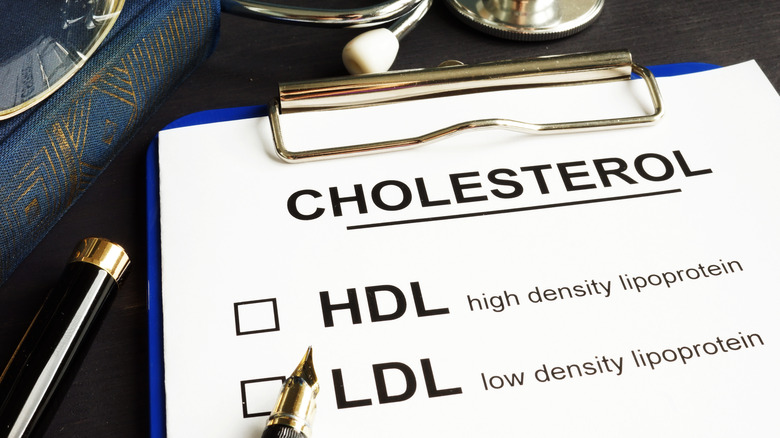What Is A Normal Cholesterol Level?
If there ever was a villain in the world of nutrition, cholesterol might be it. Cholesterol's notoriety has spread so far and wide that just the mention of it may bring up the automatic association with a heart attack. And the poster child for cholesterol-ridden, heart-attack-producing food? One of America's favorite foods: a bacon cheeseburger. But before swearing off of burgers for good, read on. Cholesterol is a bit more complicated than it might seem.
Some cholesterol is actually vital for good health. It plays a critical role in the production of hormones and vitamin D and plays a part in building and maintaining healthy cells (via Verywell Health). Cholesterol circulates through the blood attached to one of two types of lipoproteins: low-density lipoprotein (LDL) and high-density lipoprotein (HDL). We get cholesterol through the food we eat and its production by the liver.
The problem is that when levels of LDL get too high, the risk of heart attack and stroke increases. LDL is sometimes referred to as bad cholesterol because too much of it can lead to dangerous plaque buildup in the blood vessels.
A healthy lifestyle contributes to cholesterol levels
Having high levels of HDL, on the other hand, is not normally a problem. Robert Eckel, M.D., professor of medicine, emeritus, at the University of Colorado, Anschutz Medical Campus, former president of the American Heart Association and president of the American Diabetes Association, told LIVESTRONG, "It's important to understand that, if HDL is high, it's distributed in a form of cholesterol that we're not concerned about. In fact, it may be protecting women from the risk of heart attack, stroke, or death from cardiovascular disease."
That's why your LDL level, rather than total cholesterol (which is a combination of LDL and HDL), is the number to be concerned about. Healthy cholesterol levels vary according to sex and age, but in general, LDL levels should be less than 100 milligrams per deciliter (mg/dl) at any age and total cholesterol for adults aged 20 and over should be under 200 mg/dl (via Medical News Today).
Cholesterol levels can often be managed through healthy lifestyle choices including a heart-healthy diet, exercise, stress management, and not smoking (via WebMD). And when lifestyle changes aren't enough, there are options for cholesterol-lowering medications that your doctor can prescribe.

